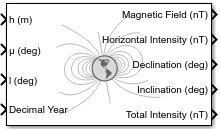World Magnetic Model
Calculate Earth's magnetic field at specific location and time using World Magnetic Model
Libraries:
Aerospace Blockset /
Environment /
Gravity
Description
The World Magnetic Model block implements the mathematical representation of the National Geospatial Intelligence Agency (NGA) World Magnetic Model. The World Magnetic Model block calculates the Earth magnetic field vector, horizontal intensity, declination, inclination, and total intensity at a specified location and time. The reference frame is north-east-down (NED).
Note
Use this block to model the Earth magnetic field between altitudes of -1,000 m to 850,000 m meters.
Limitations
All specifications have these limitations:
The specifications describe only the long-wavelength spatial magnetic fluctuations in the Earth's core. Intermediate and short-wavelength fluctuations, contributed from the crustal field (the mantle and crust), are not included. Also, the substantial fluctuations of the geomagnetic field, which occur constantly during magnetic storms and almost constantly in the disturbance field (auroral zones), are not included.
The internal calculation of decimal year does not take into account local time or leap seconds.
This block has the limitations of the World Magnetic Model (WMM). WMM2025 is valid between -1km and 850km, as outlined in the World Magnetic Model 2025 Technical Report.
In addition, each specification has these limitations:
WMM2015v2 supersedes WMM2015(v1). Consider replacing WMM2015(v1) with WMM2015v2 when used for navigation and other systems. WMM2015v2 was released by National Oceanic and Atmospheric Administration (NOAA) in February 2019 to correct performance degradation issues in the Arctic region for January 1, 2015, to December 31, 2019. Therefore, it is still acceptable to use WMM2015(v1) in systems below 55 degrees latitude in the Northern hemisphere.
The WMM2025 specification produces data that is reliable five years after the epoch of the model, which is January 1, 2025.
The WMM2020 specification produces data that is reliable five years after the epoch of the model, which is January 1, 2020.
The WMM2015 specification produces data that is reliable five years after the epoch of the model, which is January 1, 2015.
The WMM2010 specification produces data that is reliable five years after the epoch of the model, which is January 1, 2010.
The WMM2005 specification produces data that is reliable five years after the epoch of the model, which is January 1, 2005.
The WMM2000 specification produces data that is reliable five years after the epoch of the model, which is January 1, 2000.
